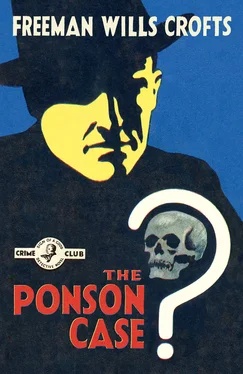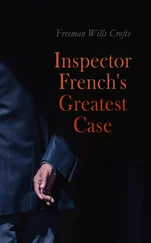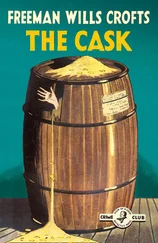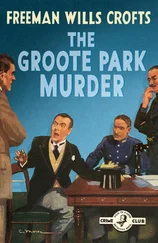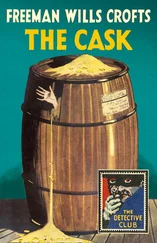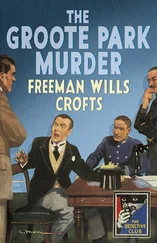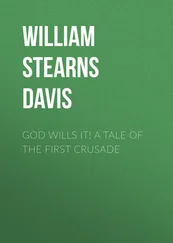After passing between the two rows of magnificent beeches, whose branches met over the drive, they reached the massive iron gates leading on to the road. These, as was usual at night, were closed, but not locked.
There being no sign of the missing man, they retraced their steps and took a narrow path which led, through a door in the wall surrounding the grounds, to the same road. This door was also closed, but unlocked. Here again their quest was fruitless.
Returning to the house they made a more general survey, visiting the terrace and formal Dutch garden below, the rose pergola, the glass house, and the various arbours—all those places in which a sudden whim might have induced the master of these delights to smoke or stroll in the pleasant evening air. But all to no purpose. Sir William Ponson had vanished.
Parkes looked at his watch. It was twenty-five minutes past seven. He was beginning a remark to Innes when the latter suddenly slapped his thigh and interrupted.
‘I’ll lay you a sovereign to five bob, Mr Parkes, I know where the boss is. He’s gone in to Mr Austin’s, and he’s kept him all night.’
Austin Ponson was Sir William’s son. In many ways he was a disappointment to his father. On leaving Cambridge he had moved to chambers in London, ostensibly to read for the bar. But though he had read, it was not law, and after a couple of years of wasted time, and a scene with his father, he had dropped the pretence of legal work and turned himself openly to the pursuit of his own special interests. Finding the boy was determined to go his own way, Sir William had decided discretion was the better part of valour, and withdrawing his opposition to Austin’s plans, had instead enabled him to carry them out, increasing his allowance to £ 1000 a year. Austin was extremely clever and versatile. Something of a dreamer, his opinions and ideals irritated his practical father almost beyond endurance. He was a Socialist in politics, and held heterodox views on the relations of capital and labour. He read deeply on these subjects, and wrote thoughtful articles on them for the better class papers. He had produced a couple of social problem novels which, though they had had small sales, had been well reviewed. But his chief study and interest was natural history, or rather that branch of it relating to the life and habits of disease-bearing insects. To facilitate research work in this direction, he had thrown up his London chambers and, partly because his relations with his father were too strained to live with him with any pleasure, and partly because the latter’s residence in Gateshead was unsuitable for his hobby, he had taken a house with a good garden near Halford. That was eleven years ago, and he had lived there with an elderly couple—butler and housekeeper—ever since. Though caring nothing for society, he was not unpopular among his neighbours, being unassuming in manner, as well as kindly and generous in disposition. When his father had signified his intention of retiring, Austin had suggested the former’s taking Luce Manor, which was then for sale. The two had agreed to sink their differences, and by avoiding controversial subjects, they continued on good though not very cordial terms. When, therefore, Innes suggested Sir William had gone to visit his son, Parkes could not but agree this might be the truth.
‘It’s not like him all the same,’ the butler went on, ‘he never would walk two miles at night when he could have had a car by just ringing for it.’
‘He’s done it, I bet, all the same,’ returned Innes, ‘I’ll lay you what you like. There was something on between them.’
‘What do you mean?’ Parkes asked sharply.
‘Why, this. I didn’t tell you what I heard—it wasn’t no business of mine—but I’ll tell you now. You remember Mr Austin dining here last Sunday evening? The boss, as you know, had the hump all day, but Mr Austin when he came first was as sweet as you please. After dinner they went to the library. Well, sir, I was passing the door about half-past nine or maybe later, and I heard their voices inside. I judged they were having a bit of a row. I heard Mr Austin shouting, “My God, sir, she isn’t!” and then I heard the mumble of Sir William’s voice, but I couldn’t hear what he said. Well, that was all of that. Then about half-past ten, when Mr Austin was leaving, I was in the hall, and got him his coat, and he was just sort of green about the gills, as if he had been laid out in the ring. He’s always pleasant enough, but that night he took his coat and hat as if I was a blooming hat-stand, and out to the car without a word, and a look on his face as if he’d seen death. And Sir William hasn’t been the same since either. Oh yes! I guess they’ve had some sort of a dust up.’
Parkes whistled.
‘About the girl?’ he said, with a sharp glance.
‘So I thought. Miss Lois Drew may be a very nice young lady, and I don’t say she’s not, but she’s hardly the kind of daughter-in-law the old man would be looking out for.’
‘It’s a fact, Innes. You’re right. Now if it had been my Lady Evelyn, things would have been different.’
‘You bet,’ said the valet.
The men’s allusion was to a subject of common gossip in Halford. Austin Ponson was universally believed to be in love with the daughter of the local bookseller. And as universally, it was assumed that such a match would have the determined opposition of Sir William.
‘I think we might send in to Mr Austin’s, and find out,’ went on Parkes after a pause. ‘If he’s there no harm’s done, and if not, why, it might be just as well to tell Mr Austin.’
‘Well, I’ll go in and see him if you think so.’
‘I would be glad. Hughes can run you in in the small car.’
Some twenty minutes later Innes rang at the door of a pleasant looking little villa on the outskirts of Halford.
‘Is Mr Austin about yet, Mrs Currie?’ he asked, as an elderly woman, with a kindly, dependable face, answered.
‘He’s not down yet, Mr Innes. Will you come in?’
The valet answered her question with another.
‘Sir William didn’t call last night, I suppose?’
‘Sir William? No, Mr Innes, I haven’t seen Sir William for over a month.’
‘Well, I’ll come in, thank you, and when Mr Austin’s ready I’d like to see him.’
‘I’ll tell him you’re waiting.’
When some twenty minutes later Austin Ponson came into the room, Innes looked at him in some surprise. As a rule Austin was a man of easy and leisurely manners, suave, polished, and unhurried. He had an air of comfortable and good-humoured contentment, that made him a pleasant and soothing companion. But this morning he was strangely different. His face was pale, and dark circles below his eyes pointed to his having passed a sleepless night. His manner was nervous, and Innes noticed his hand shaking. When he spoke it was abruptly and as if he were upset.
‘Good morning, Innes. You wanted to see me?’
‘Sorry for troubling you so early, sir, but Mr Parkes sent me in with a message.’
‘Yes?’
‘It was to ask if you knew anything of Sir William, sir. He went out late last night without saying anything about it, and he has not turned up since, and Mr Parkes was a little anxious about him in case he might have met with an accident.’
A look almost of fear appeared in the other’s eyes.
‘And how should I know anything about him?’ he answered quickly, and Innes noticed that his lips were dry. ‘He did not come here. Have you tried at Mr Hawksworth’s or Lord Eastmere’s? He has dropped in to see them often in the evening, hasn’t he?’
‘That is so, sir, but we thought we had better consult you before raising an alarm. As you say, sir, Sir William has often gone over to these places in the evening, but never without saying he would be late, and he never stopped all night.’
Читать дальше
